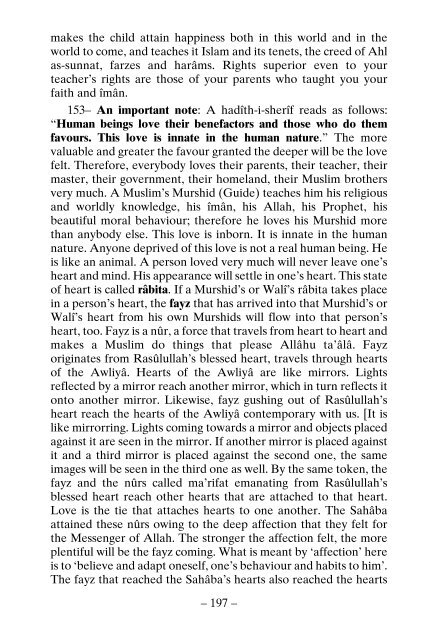O Son !
THE BOOK ‘O SON’ Al-hamdu lillâhi Rabbil ’âlamîn. Wa-s-salâtu wa-s-salâmu ’alâ Rasûlinâ Muhammadin wa Âlihi wa Sahbihi ajma’în. 1– O son! Collecting from books written by the scholars of the Hanafî Madhhab three hundred and sixty hadîth-i-sherîfs and forty-four khabars and also the seven essentials and the five rukns and the seven wâjibs and the fourteen sunnats and the twenty-five mustahabs and the fourteen mufsids of namâz, I have explained them for you. Adapt your acts and deeds to these teachings so that you attain fayz and nejât (salvation)! 2– Also for your information, I have collected a thousand and ninety âdâb (adabs) for you and for other young Muslims like you. If you adapt your actions and acts of worship to these teachings, they will be sufficient for you. If you laze, disobey Allâhu ta’âlâ and cease from these practices and manners, you will be afflicted with slavery and disgrace in the world and subjected to torment in the world to come. If you live up to them and advise your Muslim brothers to do the same, it will be useful for you. They will say blessings over you. And Haqq ta’âlâ will accept their invocations. For, a slave will be pardoned on account of another slave’s invocations for them.
THE BOOK ‘O SON’
Al-hamdu lillâhi Rabbil ’âlamîn. Wa-s-salâtu wa-s-salâmu ’alâ
Rasûlinâ Muhammadin wa Âlihi wa Sahbihi ajma’în.
1– O son! Collecting from books written by the scholars of the
Hanafî Madhhab three hundred and sixty hadîth-i-sherîfs and
forty-four khabars and also the seven essentials and the five rukns
and the seven wâjibs and the fourteen sunnats and the twenty-five
mustahabs and the fourteen mufsids of namâz, I have explained
them for you. Adapt your acts and deeds to these teachings so that
you attain fayz and nejât (salvation)!
2– Also for your information, I have collected a thousand and
ninety âdâb (adabs) for you and for other young Muslims like you.
If you adapt your actions and acts of worship to these teachings,
they will be sufficient for you. If you laze, disobey Allâhu ta’âlâ
and cease from these practices and manners, you will be afflicted
with slavery and disgrace in the world and subjected to torment in
the world to come.
If you live up to them and advise your Muslim brothers to do
the same, it will be useful for you. They will say blessings over you.
And Haqq ta’âlâ will accept their invocations. For, a slave will be
pardoned on account of another slave’s invocations for them.
Create successful ePaper yourself
Turn your PDF publications into a flip-book with our unique Google optimized e-Paper software.
makes the child attain happiness both in this world and in the<br />
world to come, and teaches it Islam and its tenets, the creed of Ahl<br />
as-sunnat, farzes and harâms. Rights superior even to your<br />
teacher’s rights are those of your parents who taught you your<br />
faith and îmân.<br />
153– An important note: A hadîth-i-sherîf reads as follows:<br />
“Human beings love their benefactors and those who do them<br />
favours. This love is innate in the human nature.” The more<br />
valuable and greater the favour granted the deeper will be the love<br />
felt. Therefore, everybody loves their parents, their teacher, their<br />
master, their government, their homeland, their Muslim brothers<br />
very much. A Muslim’s Murshid (Guide) teaches him his religious<br />
and worldly knowledge, his îmân, his Allah, his Prophet, his<br />
beautiful moral behaviour; therefore he loves his Murshid more<br />
than anybody else. This love is inborn. It is innate in the human<br />
nature. Anyone deprived of this love is not a real human being. He<br />
is like an animal. A person loved very much will never leave one’s<br />
heart and mind. His appearance will settle in one’s heart. This state<br />
of heart is called râbita. If a Murshid’s or Walî’s râbita takes place<br />
in a person’s heart, the fayz that has arrived into that Murshid’s or<br />
Walî’s heart from his own Murshids will flow into that person’s<br />
heart, too. Fayz is a nûr, a force that travels from heart to heart and<br />
makes a Muslim do things that please Allâhu ta’âlâ. Fayz<br />
originates from Rasûlullah’s blessed heart, travels through hearts<br />
of the Awliyâ. Hearts of the Awliyâ are like mirrors. Lights<br />
reflected by a mirror reach another mirror, which in turn reflects it<br />
onto another mirror. Likewise, fayz gushing out of Rasûlullah’s<br />
heart reach the hearts of the Awliyâ contemporary with us. [It is<br />
like mirrorring. Lights coming towards a mirror and objects placed<br />
against it are seen in the mirror. If another mirror is placed against<br />
it and a third mirror is placed against the second one, the same<br />
images will be seen in the third one as well. By the same token, the<br />
fayz and the nûrs called ma’rifat emanating from Rasûlullah’s<br />
blessed heart reach other hearts that are attached to that heart.<br />
Love is the tie that attaches hearts to one another. The Sahâba<br />
attained these nûrs owing to the deep affection that they felt for<br />
the Messenger of Allah. The stronger the affection felt, the more<br />
plentiful will be the fayz coming. What is meant by ‘affection’ here<br />
is to ‘believe and adapt oneself, one’s behaviour and habits to him’.<br />
The fayz that reached the Sahâba’s hearts also reached the hearts<br />
– 197 –

















